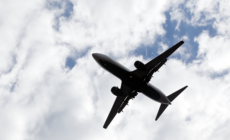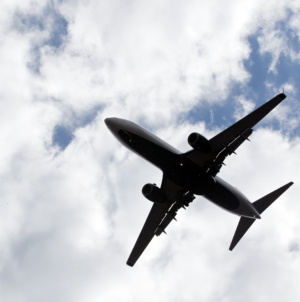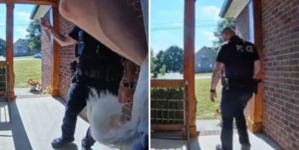-
US Flies More Than 100 Immigrants Back to China - 19 mins ago
-
JD Vance and the Fight for Pennsylvania’s Catholic Voters - 25 mins ago
-
California spending millions on release of sexually violent predators - 26 mins ago
-
Woman Wakes To Find Cops at Her Door With Food After Delivery Goes Wrong - 54 mins ago
-
High waves sweep beachgoers into the ocean in Oahu, killing two - about 1 hour ago
-
Guy Maddin’s Movie ‘Rumours’ Is Almost Normal - about 1 hour ago
-
Ted Cruz’s Chances of Losing Texas, According to Polls - about 1 hour ago
-
California mother accused of killing baby — 30 years later - 2 hours ago
-
Democrats’ Report Calls Trump Hotel Business Unethical and Unconstitutional - 2 hours ago
-
Pakistan Asks Biden to Release Woman Serving 86-Year Sentence in U.S. - 2 hours ago
Russia Accuses Ukraine of Preparing NATO-Backed ‘Chemical’ Attack
Russian officials have accused Ukraine of preparing to conduct a chemical weapons attack with the support of the United States-led NATO military alliance, ultimately seeking to lay the blame on Moscow in the midst of their war.
“We have credible information that, with Western support, Ukraine plans to stage a series of anti-Russia provocations involving use of chemical weapons in the special military operation zone,” the Russian Embassy to the United States said in a statement shared with Newsweek.
“Preparations by the Kiev regime and its curators are underway to fabricate evidence to accuse Russia of CWC [Convention on Chemical Weapons] violations during combat operations,” the statement added.
The Russian Embassy said that in preparation for the alleged attack, “NATO countries delivered over 70 advanced toxic chemical detection and recording devices to Ukraine between July and September 2024, including the latest detectors and gas analyzers.”
At the same time, the Russian Embassy said that “Ukrainian security forces have been trained both in Ukraine and at NATO centers in methods of evidence falsification,” while “NATO countries, in part through the OPCW [Organization for the Prohibition of Chemical Weapons] Technical Secretariat, are helping Ukraine build a ‘body of evidence’ to further accuse Russia of CWC violations.”
Newsweek reached out to NATO, the Ukrainian Armed Forces, the Ukrainian Defense Ministry, the Ukrainian Foreign Ministry and the U.S. State Department for comment.

Dmytro Mykhailov/Global Images Ukraine/Getty Images
The Russia-Ukraine war, which began with Russian President Vladimir Putin ordering a “special military operation” against the neighboring nation in February 2022, has featured an extensive history of competing claims of the use of chemical weapons. Both Kyiv and Moscow deny fault.
Reached for comment, the OPCW referred Newsweek to a statement issued in May by its spokesperson, who said that the organization’s secretariat “has been monitoring the situation on the territory of Ukraine since the start of the war in February 2022 in relation to allegations of use of toxic chemicals as weapons.”
“Both the Russian Federation and Ukraine have accused one another and reported allegations of use of chemical weapons to the Organisation,” the OPCW spokesperson said.
Amid the dueling accusations, the OPCW announced in July that its personnel had conducted a “Technical Assistance Visit” upon Ukraine’s request. The visit included the delivery of 70 LCD 3.3 detectors, described as “advanced warning devices that alert to gas and vapour threats detected and identified at or below levels immediately dangerous to life and health,” and training on using the devices.
The OPCW Secretariat also provided online courses on “Emergency Response to Incidents Involving Toxic Chemicals” from September 2023 to May 2024 and training on “Sampling for Investigation of Chemical Weapon Use” in June to Ukrainian experts.
As the United States and its allies continue to pledge additional military aid to Ukraine despite Moscow’s warnings and back Kyiv’s claims of Russian chemical weapons use in the conflict, the Russian Embassy issued a new protest.
“We emphasize: the collective West has created an atmosphere of impunity that emboldens the Kiev regime as it proceeds to perpetrate larger-scale crimes including use of toxic chemicals,” the Russian Embassy said in the statement shared with Newsweek.
The Russian Embassy said that Russian officials have regularly shared “detailed information” with the OPCW and U.N. Security Council regarding Ukraine’s “mass-scale use of warfare chemical agents in violation of its commitments under the CWC, as well as provocations staged by Kiev and its Western backers to falsely accuse the Russian Armed Forces of similar actions.”
“We urge Washington to stop cynically indulging in Kiev’s provocations for the sake of an illusory desire to inflict a ‘strategic defeat’ on Russia,” the Russian Embassy said. “Instead of patronizing the Ukrainian puppets who are writhing in agony, the American administration should critically consider what is happening and the possible risks emanating from Ukrainian “chemical terrorism.”
The comments came a day after the United Kingdom issued sanctions against Russia’s Radiological, Chemical and Biological (RCB) Defense Troops and their commander, Lieutenant General Igor Kirillov, “for the deployment of barbaric chemical weapons in Ukraine.”
Two Russian Defense Ministry laboratories were also blacklisted by the United Kingdom “for providing support for the development and deployment of these inhumane weapons for use on the frontlines.”
“Russian forces have openly admitted to using hazardous chemical weapons on the battlefield, with widespread use of riot control agents and multiple reports of the use of the toxic choking agent chloropicrin – first deployed on the battlefields of WW1,” the U.K. Foreign Ministry said in its announcement Tuesday.
The Russian Embassy to the U.K. denied the allegations, saying, “Our Armed Forces don’t have chemical weapons in their arsenals, which was confirmed by international inspections.” The statement also accused London of “seeking to conceal the evidence of the use of banned toxic substances and chemical agents by the Kiev regime’s forces.”
Kirillov also refuted the claims by stating Monday that the Russian military’s chemical weapons stockpile had been destroyed in 2017, as confirmed by the OPCW and the U.S., which announced the elimination of its own arsenal last year.
That same day, Russia’s Federal Security Council (FSB) announced that it found “four bottles of the chloropicrin toxic substance” alongside a cache of weapons near the settlement of Pervomayskoye in Donetsk province, one of four Ukrainian territories annexed by Russia in an internationally disputed referendum in September 2022.

Alexander Melnikov/Sputnik/AP
Chloropicrin is a substance largely used for agricultural purposes that has also been weaponized to produce a poison gas that can cause severe irritation to the skin, eyes, respiratory tract and gastrointestinal tract, as well as vomiting and diarrhea. The OPCW categorizes chloropicrin as a choking agent, and its use in war is banned under the CWC, to which Russia, Ukraine and all NATO member states are signatories.
Claims of Russia using chloropicrin in the war date back at least to late 2022 when the Ukrainian Navy accused Russian forces of dropping K-51 aerosol grenades containing chloropicrin from drones in eastern Ukraine. As of Tuesday, the Ukrainian Armed Forces reported “4,228 applications of munitions equipped with dangerous chemicals,” including K-51 and RG-Vo gas grenades.
In May of this year, the U.S. State Department also accused Moscow of using chloropicrin in violation of the CWC and issued sanctions against Russia’s RBC Defense Troops and other entities.
The OPCW noted this accusation and Moscow’s denial but said it had not yet been formally asked to take action in the May statement shared with Newsweek.
“It is recalled that, to conduct any activities pertaining to allegations of use of toxic chemicals as weapons, the Secretariat of the OPCW would need to be formally seized of a request to conduct such activity by States Parties,” the OPCW spokesperson said at the time.
“So far, the Secretariat has not received any such request for action,” the spokesperson added. “We will continue to monitor the situation and maintain our readiness to deploy.”
In August, as the Ukrainian military conducted a surprise incursion into Russia’s Kursk province, acting Kursk Governor Aleksey Smirnov informed Putin that Ukrainian forces had fired shells containing unspecified “chemical weapons,” causing several police officers and the head of the village council to be “poisoned.”
Last month, U.S. Secretary of State Antony Blinken joined G7 counterparts in issuing a joint statement that included an expression of “deepest concern about the reported use of chemical weapons as well as riot control agents as a method of warfare by Russia in Ukraine.”
Source link


















